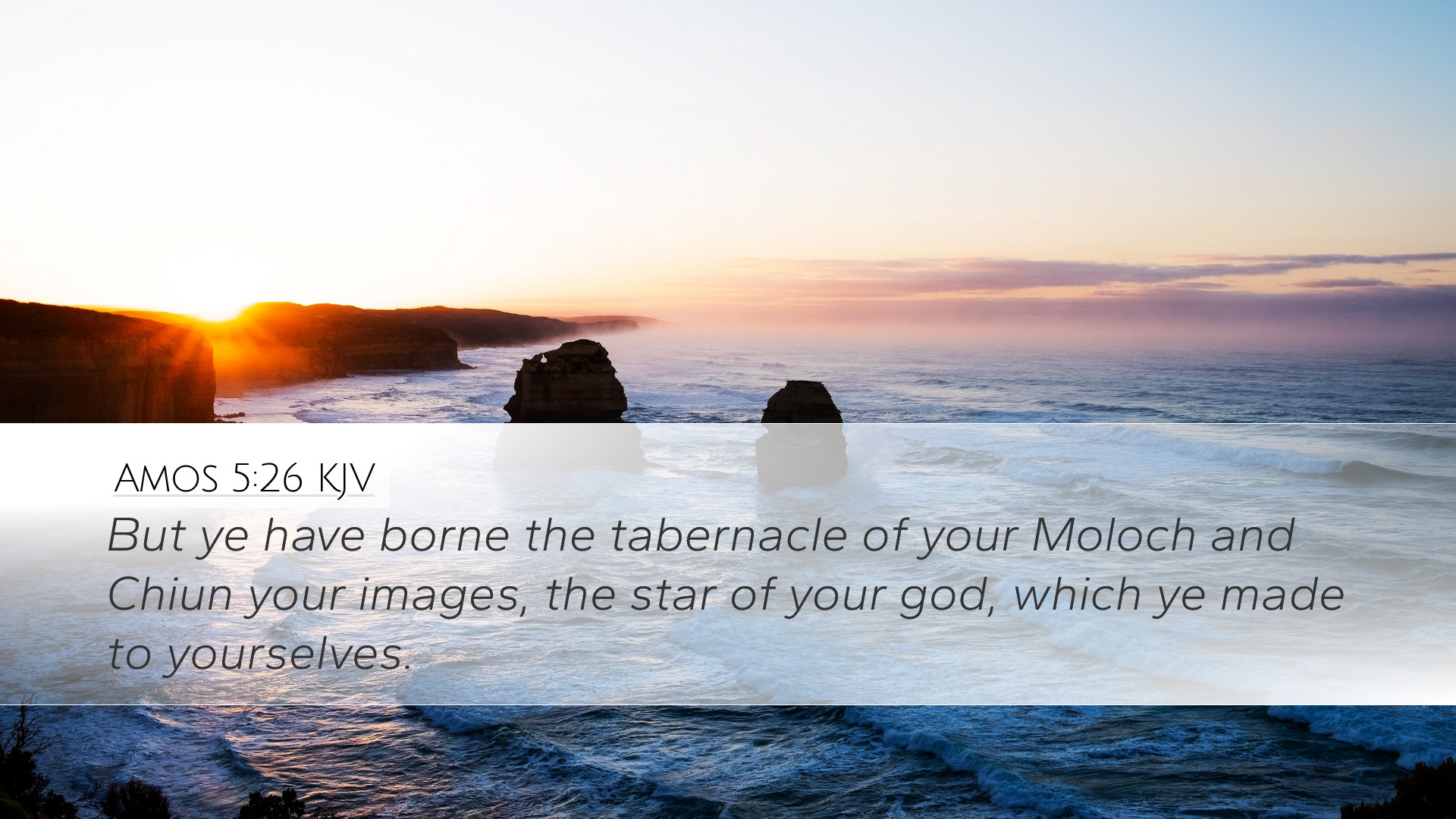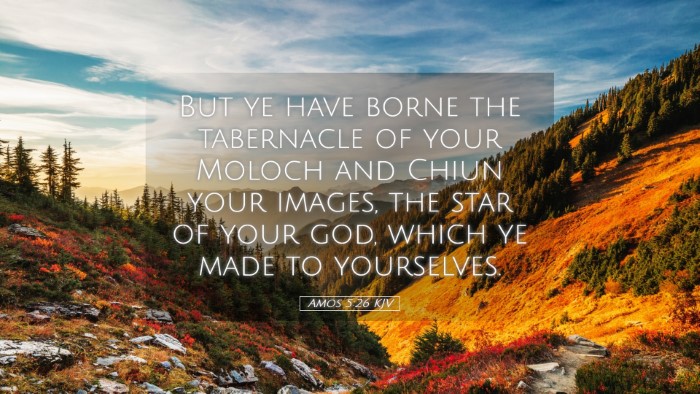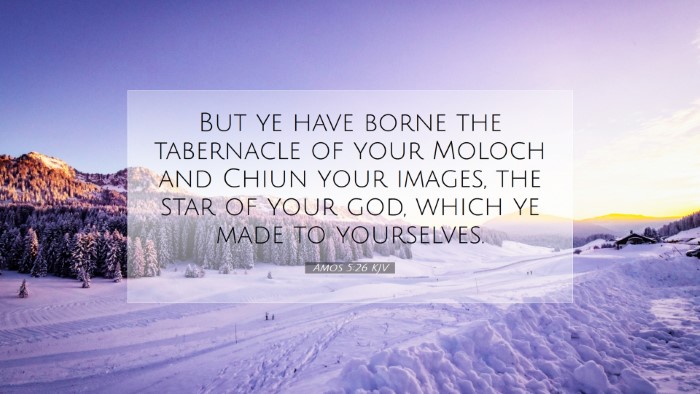Old Testament
Genesis Exodus Leviticus Numbers Deuteronomy Joshua Judges Ruth 1 Samuel 2 Samuel 1 Kings 2 Kings 1 Chronicles 2 Chronicles Ezra Nehemiah Esther Job Psalms Proverbs Ecclesiastes Song of Solomon Isaiah Jeremiah Lamentations Ezekiel Daniel Hosea Joel Amos Obadiah Jonah Micah Nahum Habakkuk Zephaniah Haggai Zechariah MalachiAmos 5:26
Amos 5:26 KJV
But ye have borne the tabernacle of your Moloch and Chiun your images, the star of your god, which ye made to yourselves.
Amos 5:26 Bible Commentary
Amos 5:26 - Commentary Summary
The verse reads:
"But you have borne the tabernacle of your Moloch and Chiun, your images, the star of your god, which you made to yourselves."
Contextual Overview
The Book of Amos is a prophetic work that addresses the social injustices and spiritual failures of Israel. Amos, a shepherd from Tekoa, delivers God's messages to a people caught in the complacency of wealth and idolatry. In this particular verse, the prophet calls attention to the spiritual corruption prevalent among the Israelites, highlighting the consequences of their idolatrous practices.
Insights from Commentaries
Matthew Henry’s Commentary
Henry emphasizes the grievous nature of Israel's sin. The people, who were chosen by God, turned away from their covenant relationship. Instead of worshiping Yahweh, they created and revered idols, including Moloch, a deity often associated with child sacrifice. Henry notes the stark contrast between God’s expectations and the people’s actions.
- The Tabernacle of Moloch: Henry points out that this signifies not only idolatry but the depths of depravity to which the Israelites had sunk. They not only tolerated but seemingly embraced pagan worship.
- Chiun: Similar to Moloch, Chiun represents another foreign deity, indicating the syncretism that plagued Israel. This mixing of worship practices is a strong admonition against compromising faith.
- Consequences of Idolatry: Henry warns that such idol worship leads to dire consequences—both spiritually and physically, emphasizing that forsaking God invites judgment.
Albert Barnes’ Notes on the Bible
Barnes provides a historical critique of Israelite worship practices. He observes that the Israelites had created physical representations of their gods, illustrating their departure from true worship. His commentary highlights the absurdity of worshipping created images over the Creator.
- The Star of Your God: Barnes interprets this phrase as representing astrological worship, where the Israelites sought guidance from heavenly bodies instead of the divine authority of God. This reflects a profound misunderstanding of God's nature and sovereignty.
- Self-Made Images: The term “which you made to yourselves” suggests a self-centered approach to religion, where the people fashioned their gods according to their desires rather than submitting to the will of Yahweh.
- The Nature of Idolatry: Barnes succinctly notes that idolatry is often born out of a desire for control and self-satisfaction, a theme that resonates through much of the prophetic literature.
Adam Clarke’s Commentary
Clarke delves into the specific deities mentioned, offering cultural and historical insights. He explains the significance of Moloch and Chiun, and discusses their worship practices, which included immoral and violent rituals, drastically opposed to the holiness of God.
- Cultural Practices: Clarke illustrates the cultural climate of the time, where the influences of surrounding nations led the Israelites into syncretism. This blending of worship practices reveals a profound neglect for the religious laws given by God.
- Spiritual Implications: He argues that such practices not only displeased God but also blinded the people to their true spiritual condition, resulting in both individual and national consequences.
- Call to Repentance: Clarke emphasizes the broader message of Amos, which is a call to repentance and a return to authentic worship, devoid of pagan associations.
Theological Implications
This verse serves as a cautionary tale regarding the dangers of idolatry, both in ancient Israel and in contemporary contexts. It emphasizes key theological themes such as:
- The Nature of God: The stark contrast between God and false deities highlights God's holiness and sovereignty.
- Human Responsibility: The active choice of the Israelites to turn to idolatry serves as a reminder of humanity's propensity to stray from divine commands.
- Judgment and Hope: While judgment is pronouncement through this verse, there remains an underlying hope for repentance and restoration.
Conclusion
Amos 5:26 offers profound insights into the human condition, the consequences of forsaking God, and the call to genuine worship. The combined commentary from Matthew Henry, Albert Barnes, and Adam Clarke encapsulates the seriousness of idolatry and the need for a sincere relationship with the Divine, urging pastors, students, theologians, and Bible scholars to reflect deeply on these themes in their study and preaching.


